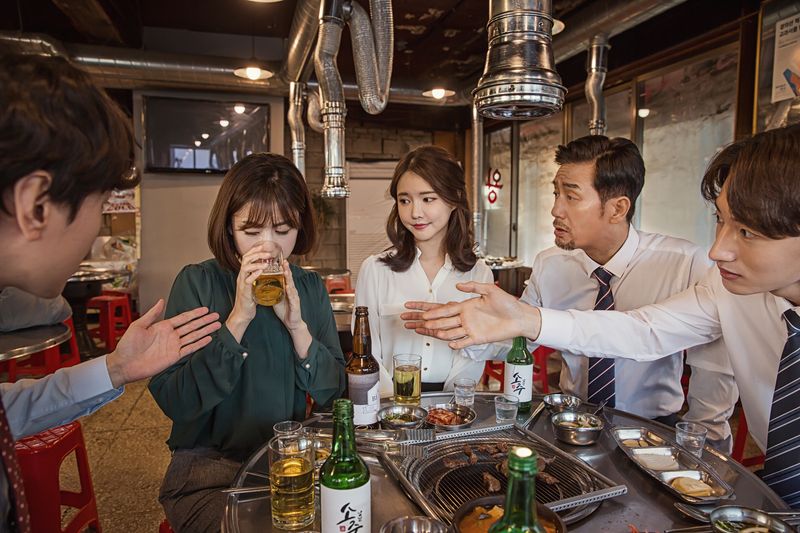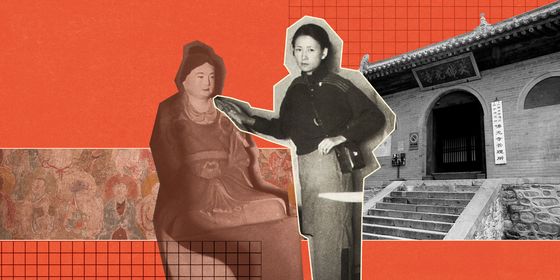A sexual assault case at Alibaba has led young Chinese to protest against the culture of coerced drinking and toasting at work
At 11 p.m., after three hours of drinking with a dozen colleagues and clients at the Sheraton hotel, 26-year-old Zhang Ke (alias) wobbled back home hugely relieved, thinking “It’s all over now.”
Zhang works as a data analyst in a finance company in southeastern China’s Jiangsu province. Though it is not a client-facing job, Zhang is required to attend business drinks with clients at least once per month, contrary to her expectations while job-hunting. What disturbs Zhang is not the alcohol but that her employer pressures her to attend—and that the culture of business drinking exposes female workers, in particular, to sexual harassment.
“At a banquet, a client held my female colleague’s hands in the name of ‘having a heart-to-heart talk,’ and our boss remarked, ‘You touched her hand even before it was my turn!’” she tells TWOC. “Maybe he was trying to save her [from the client], yet his remark made me feel uncomfortable.”
On August 7, a female employee at China’s e-commerce giant Alibaba reported she had been coerced into drinking on a business trip and sexually assaulted by her manager and a client in late July. After calling the police, the employee handed out leaflets in the company’s canteen to draw attention to her experience, as she received no help from a higher-level company manager, who had described drinking as necessary to doing business.
A public backlash against Alibaba on China’s social media followed the allegation, with hashtags like “firmly refuse vile business drinking culture,” drawing 220 million views and 14,000 comments. Two days later, Alibaba CEO Daniel Zhang reportedly announced in a memo that the alleged perpetrator had been fired, and that two managers who had ignored or downplayed the allegation had also resigned. Next day, the Central Commission for Discipline Inspection (CCDI), China’s anti-corruption agency, made an official criticism on Alibaba’s drinking culture, toxic work environment, and “unspoken rules” forcing employees to drink and socialize against their will at the workplace. “They may seem non-existent, but they stubbornly exist,” the CCDI wrote on its website.
Drinking is a pervasive social ritual and obligation to build rapport during business events in China, where guanxi (personal relationships) matter in securing deals. Typically, business drinking happens during a dinner outside of working hours, meaning drinking takes place throughout the meal, and representatives from every party at the table have to make at least one toast to show gratitude, make friends, or share anticipation for future deals.
There are several unwritten rules for business drinking in China. Young employees especially are expected to make toasts at dining tables, symbolizing their respect for and humility towards superiors and clients. It is considered rude to refuse when toasted by others, especially someone in a higher position. Sometimes, when senior managers have had too much to drink, or simply want to avoid drinking, they make junior employees act as proxy drinkers—often ending with their juniors reeling or vomiting.
China is not alone among East Asian countries in having business drinking cultures. In South Korea, the term gapjil refers to “workplace traditions of forced drinking sessions, long hours, and weekend work,” according to Insider. Japan also has a tradition of drinking with colleagues and bosses, though the country is reportedly gradually shifting away from mandatory workplace drinking sessions.
The Alibaba incident is not the first time China’s toxic drinking culture has come under the spotlight. Last year a bank clerk in Beijing slapped a new hire after he turned down a toast from a senior staff member during an informal banquet. In 2019 Feng Gang, a sociology professor at Zhejiang University with a history of making controversial statements, attracted public criticism after he boasted on Weibo that he disqualified a postgraduate candidate from studying under him because the student couldn’t drink over half a catty of liquor—though Feng and his students made him drink so much that he had to be carried back to the hotel.
According to an online survey on young people’s aversion to business drinking created on August 9 by China Newsweek magazine, 84 percent of the 693, 000 respondents had “extreme disgust and zero tolerance” for the practice, while 14 percent said they had participated “under coercion.”
Zhang agrees. “My only choice is to drink up [when asked], or it would affect my career,” she says. “Most likely, I would not be able to get recognized at work and take over key projects, and my bonus will get reduced.”
The patriarchal nature of business drinking, led by male managers and executives, also bothers Zhang. “When we have banquets, the bosses generally bring good-looking female colleagues no matter how good at drinking they are, thinking ladies can add spice to the banquet. It’s extremely objectifying.” In some extreme cases, male managers call prostitutes to attend banquets, according to Lü Pin, a Chinese feminist activist based in New York in an interview with Nikkei Asia. A Ms. Luo, who became China’s first woman to win a sexual harassment lawsuit against her employer in 2009, accused her former boss of grabbing her neck and breasts at the company’s end-of-year drinking party.
Xiong Xinfa, a career consultant with over 600,000 followers on China’s Weibo tells TWOC obliging youngsters to drink is “a means of workplace bullying,” in line with in-built power imbalances and hierarchies.
“Speaking of workplace bullying, a host of elements contribute to it: how much the bullying culture publically shapes the philosophy of companies, how arrogant the abusers are by nature and how obedient our victims are to being doormats and how ignorant other observers are to unwittingly fan the flames,” Xiong explains.
Some younger Chinese are refusing to participate in the elaborate toasting rituals and power games in their own way. Zhou Wenkai, a 27-year-old business manager of a central enterprise’s subsidiary in Beijing, has to attend business banquets with clients three times every month on average since he started his job in 2018. Alcohol upsets his stomach, and he dislikes “the hypocritical and meaningless wording of guanxi,” he tells TWOC. So he has found quiet ways to rebel.
“Normally, I spit alcohol into a towel at hand. Once, when I drank red wine [which would stain the towel], I resorted to something else—I mixed it with a glass of watermelon juice and shook them together. I am a crafty dude, you know,” Zhou says.
Still, Zhou says, his boss discovered his trick, putting pressure on him to drink. “My boss still kept urging me to get rid of my bookish demeanor and make more toasts, but I still couldn’t accept it. Then he started scolding me, ‘How could you have no foresight on your career path?’” he says. After news of the sexual assault allegations broke at Alibaba, Zhou shared a Beijing News article with some friends at work about young people rebelling against business drinking, and they agreed to take a stance together to refuse forced toasting at their next business banquet.
Xiong offers several suggestions to better safeguard employees’ rights: developing consensus among the general public against workplace bullying, and drafting national-level regulations and laws for employees’ rights and employers’ obligations. Sina, another major Chinese internet company, recently updated its employees’ handbook with the clause, “Our employees, regardless of gender, are empowered to reject forced drinking and sexual harassment by a customer or supervisor.” Additionally, Xiong advocates putting companies on a court blacklist for workplace bullying, and suggests that labor unions or women rights groups take a stance against sexual harassment in the workplace.
For Zhang, the recent Alibaba headline coupled with her three-year business-drinking experiences has made her realize “you should work to live instead of living to work.”
She plans to put this new philosophy into practice right away—by drinking on her own terms at the next banquet. “It’s time to be brave now, and to drink as I wish at these business banquets, and say no to toasts. I won’t rely on drinking ability and cultivating relationships with superiors to prove my potential anymore,” she says.














